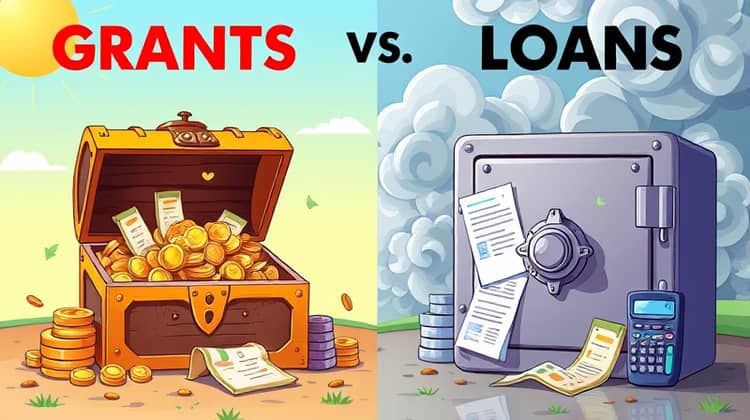Government Grants vs. Loans: What You Need to Know

Navigating the world of financing can be daunting, especially for individuals or organizations seeking financial support for projects or initiatives. Understanding the differences between government grants and loans is essential for making informed decisions. Each option offers unique advantages and considerations that can significantly impact the success of your endeavor.
In this article, we will explore the definitions, characteristics, benefits, drawbacks, and application processes for both government grants and loans. By the end of this guide, you will have a clearer understanding of how these two financial avenues can serve your needs.
Whether you are starting a new business, funding a research project, or seeking assistance for personal financial goals, knowing the fundamentals of grants and loans can empower you to choose the best option for your circumstances. Let's dive in!
What are Government Grants?

Government grants are funds provided by the federal, state, or local government to support specific projects or initiatives that are deemed beneficial to public welfare. Unlike loans, grants do not require repayment, making them a coveted source of funding for individuals, businesses, and nonprofit organizations alike.
Grants can be awarded for a variety of purposes, including educational initiatives, research projects, community development, and environmental preservation. The primary goal of these grants is to stimulate growth and innovation in areas that may lack sufficient private funding.
To receive a grant, applicants typically must meet specific eligibility criteria and demonstrate how their proposed project aligns with the objectives of the grant program. The application process can be competitive, often requiring detailed proposals and project plans.
Characteristics of Grants

Grants are often characterized by their non-repayable nature. Once awarded, recipients do not have to pay back the funds unless they fail to comply with the grant's terms and conditions. This feature makes grants particularly appealing to those in need of financial support without the burden of debt.
Additionally, grants are usually awarded based on merit, meaning that a project’s intellectual, social, or economic value is assessed to determine eligibility. Funders evaluate proposals extensively before deciding to allocate resources based on their priorities.
- Non-repayable funds
- Competitive application process
- Specific eligibility requirements
- Project alignment with grant objectives
The nature of grant funding often encourages innovation and allows recipients to undertake projects they couldn't finance otherwise. However, adherence to strict regulations and reporting requirements is essential to maintaining grant funding.
What are Loans?

In contrast to grants, loans are borrowed funds that must be paid back over time, often with interest. These financial instruments come from various sources, including banks, credit unions, and government programs designed to support specific sectors such as education, business, or housing.
Loans provide borrowers with immediate access to capital, which can be crucial for initiating or expanding projects or businesses. However, the obligation to repay loans makes them less favorable for individuals or organizations with limited cash flow.
Different types of loans come with various interest rates, terms, and repayment structures. Some loans may offer flexibility in repayment, while others may require stringent adherence to a set schedule.
Characteristics of Loans

Loans are typically characterized by their repayable nature. Borrowers must return the principal amount along with any applicable interest within a specified period. The commitment to repayment can impact financial planning and cash flow management in the long term.
Moreover, loans generally require collateral or a personal guarantee to secure the borrowed amount. This requirement protects lenders while ensuring that borrowers are committed to repaying the loan.
- Repayment required with interest
- Collateral or guarantee may be necessary
- Variety of loan types and terms
Understanding these characteristics is crucial for potential borrowers, as they can significantly influence the financial landscape and decision-making process regarding project funding.
Key Differences Between Grants and Loans

While both grants and loans can provide essential funding for projects, their fundamental differences differ significantly in their nature and repayment requirements. Grants offer funding that does not require repayment, making them attractive for funding initiatives without the burden of debt.
Conversely, loans must be repaid with interest, which necessitates careful financial planning on the part of the borrower.
- Grants are non-repayable; loans are repayable
- Grants are awarded based on merit; loans are based on creditworthiness
- Grants often have specific project requirements; loans can be more flexible
By understanding these differences, individuals and organizations can better assess which option aligns with their financial goals and project requirements.
Benefits of Government Grants

Government grants offer numerous advantages to recipients, making them an ideal option for funding various projects. Primarily, the most significant benefit is that they do not require repayment, allowing organizations or individuals to leverage the funds without incurring debt. This feature enables them to focus more resources on project execution rather than financial obligations.
Additionally, grants often facilitate innovation, as they allow recipients to explore new ideas or revive underfunded areas without the pressure of profit generation. This support can lead to groundbreaking research, artistic endeavors, or community-focused projects that enrich society.
- No repayment required
- Encouragement of innovative solutions
- Potential for additional funding opportunities
These benefits position grants as an invaluable financial resource for those seeking to positively impact their communities or fields.
Drawbacks of Government Grants

Despite their numerous benefits, government grants come with several drawbacks. First and foremost is the highly competitive nature of the application process. Many grants receive far more applications than available funds, making it challenging for some deserving projects to secure financing.
Moreover, grants often come with strict conditions and reporting requirements that can impose additional administrative burdens on recipients. This oversight can detract from the actual work intended to utilize the funding efficiently.
- Highly competitive application process
- Strict reporting and compliance requirements
- Limited funding availability
These factors can make the grant process challenging, necessitating thorough preparation and a solid understanding of the requirements involved.
Benefits of Loans

Loans offer a range of benefits that can be appealing to borrowers. First, they typically provide immediate access to substantial amounts of capital, which can be vital for businesses looking to expand or individuals seeking to finance significant expenses, such as education or home purchasing.
Moreover, unlike grants, loans often allow for flexibility in how the funds are used, provided they fall within the agreed-upon terms. This flexibility can open up various opportunities for growth and development that might otherwise be constrained by stricter funding sources.
- Immediate access to capital
- Flexible use of funds
- Variety of loan options available
Understanding these benefits helps potential borrowers to navigate their financing options effectively and identify the best loans to suit their needs.
Drawbacks of Loans

While loans come with potential benefits, they also have notable drawbacks. The primary concern is the repayment obligation; borrowers must return the principal plus interest, which can strain finances, especially if cash flow is limited or unexpected expenses arise. Additionally, failure to repay loans can lead to severe consequences, including damage to credit scores and legal repercussions.
Another drawback is the intricate loan application process. Lenders often impose strict requirements for approval, including income verification, credit history checks, and collateral. This process can discourage some applicants or complicate the funding timeline.
- Repayment required with interest
- Potential impact on credit scores
- Complex application process
These drawbacks necessitate careful consideration of one's financial situation before pursuing a loan to ensure that it aligns with long-term financial goals.
How to Apply for Government Grants

Applying for government grants typically begins with thorough research to identify grant opportunities that align with your project goals. Numerous databases and government websites list available grants, including eligibility criteria and application deadlines. It's crucial to understand the specific requirements of each grant program before proceeding further.
After identifying the right grant, the next step is to prepare a detailed proposal. This proposal should outline your project, its objectives, budget, and how it aligns with the grant's mission. Attention to detail and clarity in writing will greatly enhance your chances of success in this competitive process.
Finally, be diligent in submitting your application before the deadline and following up for any required documentation or further questions from the grant reviewers. Patience and perseverance are key, as the review process can take time.
How to Apply for Loans

Applying for loans typically requires preparing an extensive financial overview, including credit history, income statements, and any collateral if necessary. This initial documentation is crucial as it helps lenders assess your creditworthiness and ability to repay the debt. Additionally, borrowing entities should compare various loan options to find the best terms and rates.
Once you have collected all necessary documents and chosen a lender, you can proceed with submitting your loan application. Be prepared to answer questions related to your finances and intended use for the funds.
- Research potential loan options
- Prepare financial documentation
- Submit application and follow up
Being organized and proactive in the application process can significantly improve your chances of loan approval.
Conclusion

Understanding the differences between government grants and loans is essential for making informed financial decisions. Each option offers unique benefits and drawbacks, and knowing how to navigate these avenues can enhance your capacity to find funding for projects or initiatives.
Ultimately, your choice between a grant and a loan will depend on your project goals, financial situation, and the nature of the funding required. Thorough evaluation and research into both options can empower you to select the most suitable funding method for your needs.






